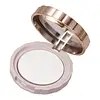What's inside
What's inside
 Key Ingredients
Key Ingredients

 Benefits
Benefits

 Concerns
Concerns

 Ingredients Side-by-side
Ingredients Side-by-side

Talc
AbrasivePolymethyl Methacrylate
Cetyl Ethylhexanoate
EmollientSqualane
EmollientPolyethylene Terephthalate
Zinc Laurate
Silica
AbrasiveIsostearyl Sebacate
Skin ConditioningEthylparaben
PreservativeMethylparaben
PreservativeDisodium Stearoyl Glutamate
CleansingStearyl Glycyrrhetinate
Skin ConditioningAluminum Hydroxide
EmollientSodium Hyaluronate
HumectantSodium Acetylated Hyaluronate
HumectantHydrolyzed Hyaluronic Acid
HumectantIron Oxides
Mica
Cosmetic ColorantTalc, Polymethyl Methacrylate, Cetyl Ethylhexanoate, Squalane, Polyethylene Terephthalate, Zinc Laurate, Silica, Isostearyl Sebacate, Ethylparaben, Methylparaben, Disodium Stearoyl Glutamate, Stearyl Glycyrrhetinate, Aluminum Hydroxide, Sodium Hyaluronate, Sodium Acetylated Hyaluronate, Hydrolyzed Hyaluronic Acid, Iron Oxides, Mica
Silica
AbrasiveEthylhexyl Methoxycinnamate
UV AbsorberDiisostearyl Malate
EmollientDimethicone
EmollientTriethylhexanoin
MaskingZinc Oxide
Cosmetic ColorantPetrolatum
EmollientTriethoxycaprylylsilane
Potassium Hydroxide
BufferingWater
Skin ConditioningBHT
AntioxidantButylene Glycol
HumectantVitis Vinifera Seed Oil
EmollientCitrus Sunki Seed Extract
AntioxidantRosmarinus Officinalis Leaf Extract
AntimicrobialAnthemis Nobilis Flower Extract
MaskingCitrus Limon Fruit Extract
MaskingPerilla Ocymoides Leaf Extract
TonicAloe Barbadensis Leaf Extract
EmollientTocopherol
AntioxidantMethylparaben
PreservativeTitanium Dioxide
Cosmetic ColorantCI 77492
Cosmetic ColorantTalc
AbrasiveMica
Cosmetic ColorantSynthetic Ruby
AbrasiveOlea Europaea Fruit Oil
MaskingSynthetic Fluorphlogopite
Squalane
EmollientJojoba Oil/Macadamia Seed Oil Esters
Skin ConditioningSimmondsia Chinensis Seed Oil
EmollientSilica, Ethylhexyl Methoxycinnamate, Diisostearyl Malate, Dimethicone, Triethylhexanoin, Zinc Oxide, Petrolatum, Triethoxycaprylylsilane, Potassium Hydroxide, Water, BHT, Butylene Glycol, Vitis Vinifera Seed Oil, Citrus Sunki Seed Extract, Rosmarinus Officinalis Leaf Extract, Anthemis Nobilis Flower Extract, Citrus Limon Fruit Extract, Perilla Ocymoides Leaf Extract, Aloe Barbadensis Leaf Extract, Tocopherol, Methylparaben, Titanium Dioxide, CI 77492, Talc, Mica, Synthetic Ruby, Olea Europaea Fruit Oil, Synthetic Fluorphlogopite, Squalane, Jojoba Oil/Macadamia Seed Oil Esters, Simmondsia Chinensis Seed Oil
 Reviews
Reviews

Ingredients Explained
These ingredients are found in both products.
Ingredients higher up in an ingredient list are typically present in a larger amount.
Methylparaben is a preservative and is a paraben. It is used to prevent the growth of fungus, mold, and other harmful bacteria. Parabens are chemicals used as preservatives in both cosmetics and food.
Methylparaben can be synthetically created. It can also be found naturally in some fruits, such as blueberries.
Oftentimes, Methylparaben is combined with other parabens to help increase the shelf life.
The safety of Methylparaben is currently being studied. While ongoing studies are looking into the safety of parabens, the results have been very mixed. Some studies have not found Methylparaben to be harmful.
Learn more about MethylparabenMica is a naturally occurring mineral used to add shimmer and color in cosmetics. It can also help improve the texture of a product or give it an opaque, white/silver color.
Serecite is the name for very fine but ragged grains of mica.
This ingredient is often coated with metal oxides like titanium dioxide. Trace amounts of heavy metals may be found in mica, but these metals are not harmful in our personal products.
Mica has been used since prehistoric times throughout the world. Ancient Egyptian, Indian, Greek, Roman, Aztec, and Chinese civilizations have used mica.
Learn more about MicaSilica, also known as silicon dioxide, is a naturally occurring mineral. It is used as a fine, spherical, and porous powder in cosmetics.
Though it has exfoliant properties, the function of silica varies depending on the product.
The unique structure of silica enhances the spreadability and adds smoothness, making it a great texture enhancer.
It is also used as an active carrier, emulsifier, and mattifier due to its ability to absorb excess oil.
In some products, tiny microneedles called spicules are made from silica or hydrolyzed sponge. When you rub them in, they lightly polish away dead skin layers and enhance the penetration of active ingredients.
Learn more about SilicaSqualane is an emollient that helps the skin hold onto moisture. It's an oily liquid that occurs naturally in certain types of fish and plant oils.
Because squalane boosts hydration in the skin, it also comes with plenty of benefits: it is an antioxidant and can help fight free radicals and skin damage. Squalane is also found to have a detoxifying effect when applied.
Squalane comes from squalene, which occurs naturally within the sebum of our skin. It is one of the oils our skin produces to keep itself hydrated. Squalane is the hydrogenated version of squalene and has a longer shelf life.
Research shows that squalane is non-irritating (even at 100% concentration).
In general, it's a fantastic ingredient. It does a great job at hydrating the skin, and it's suitable for those with sensitive skin.
The source of squalane may impact malassezia / fungal acne. This is because olive oil derived squalane can contain impurities such as fatty acids and plant waxes. Sugarcane derived squalane is recommended for anyone with malassezia concerns.
Is squalane vegan?
This depends on the source. Squalane can be derived from both plants and animals. Most squalane used in skincare comes from plants.
Please note: the source of squalane is only known if disclosed by the brand. We recommend reaching out to the brand if you have any questions about their squalane.
Read more about squalene with an "e".
Is squalane an oil?
Squalane is often called an oil, but it’s technically not; it’s a hydrocarbon, meaning it’s only made of carbon and hydrogen, unlike true oils which are triglycerides made of fatty acids and glycerol.
The term “oil-free” isn’t regulated, so companies can define it however they want. Some exclude all oils, while others just avoid mineral oil or comedogenic oils.
While some people avoid oils thinking they cause breakouts, the right kind of oil (or oil-like ingredient like squalane) can actually help balance and hydrate your skin. It’s worth testing out simple oils or squalane to see what works best for your skin.
Learn more about SqualaneTalc is a clay mineral. It helps absorb moisture and improve the texture of products. Like other types of clay, Talc can have a slight exfoliating effect on skin. Talc can be added to increase the volume of products.
Some Baby powders are made by combining talc with corn starch. The word "talc" comes from Latin and originates from Arabic. Talc is a mineral commonly found throughout the world.
If you have any concerns about using talc, we recommend checking out the FDA's official page.
Learn more about Talc